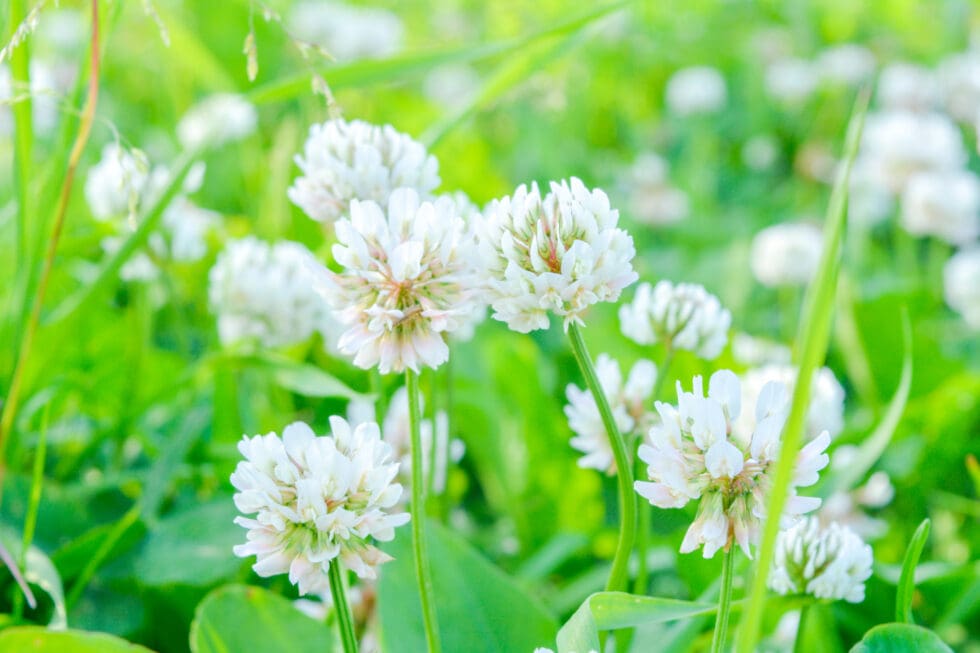
Clover loves to infiltrate lawns. Many weed killer labels may say they control clover, but the professionals at Green Seasons will tell you from experience that clover is a fighter and most weed killers are not effective. This post contains all the information you need to know what will kill the clover in your Missouri lawn.
Types of Clover that Grow in Missouri
There are 51 different types of clover. The two most common types found in Missouri are White Clover and Red Clover. Red Clover is the most widely grown of all the true clovers. It is usually grown intentionally in prairies or for hay crops. It has dark pink flowers and stems that grow until about 14 inches. You most likely will not find it on your lawn.
What is more likely to grow in your lawn is White Clover. White Clover is fairly easy to identify. Each stem has three petal-shaped leaves,it is usually dark green and sprouts pale pink flowers that grow around six inches. This clover can reseed itself under favorable conditions and spread rapidly. It grows best under cool, moist weather conditions.

Is Clover a Weed?
Clover is generally considered to be a weed because it’s usually an unwanted plant. Clover is a wild plant that grows in competition with cultivated plants, usually the grass in your lawn. Although the roots are usually shallow, clover spreads quickly. It can choke out the grass by stealing the essential nutrients from your lawn’s roots. Most people tend to want to get rid of clover because it grows in dark leafy patches that are higher than the rest of your lawn.
Why is Clover Growing in Your Lawn?
Clover can rapidly spread if the conditions of your lawn aren’t right. Here are some reasons you may be seeing a spike in your lawns clover growth.
The soil pH levels in your soil are wrong
Clover can thrive in soil conditions that are unsuitable for grass. Grass does not do well in pH levels that are too low or too high, but clover does well in almost any pH level. The more acidic your soil is the harder it is for your grass to grow and much easier for clover. Luckily, you can use soil amendments like lime to balance out the pH.
If your lawn is not regularly maintained
If you do not take care of your grass, it can become stressed and unhealthy. This stress causes grass to grow lower and less dense leaving room for clover to invade. Maintaining your lawn regularly guarantees that the roots of your lawn will grow deeper. Green Seasons would be happy to help with all of your lawn maintenance needs. Contact us for your free consultation.
Your lawn lacks essential nutrients
Other plants in your lawn need essential nutrients such as nitrogen, but clover will grow in nitrogen-deficient soil. If you find an excessive amount of clover growing, it is an indication that your soil is love on nitrogen. The best way to improve your lawn’s nitrogen levels is to add fertilizers to improve the conditions. If you are not sure about your lawns nutrient levels call the professionals at Green Seasons to help with your lawn fertilization needs.
If your soil is compacted
Soil compaction can cause many problems in your lawn. The roots of your grass won’t be able to reach down to water and other essential nutrients. Clover has a shallow root system, so it will thrive in these conditions.One of the best ways to relieve soil compaction is by lawn aeration. If you have any questions about lawn aeration contact the professionals at Green Seasons for a free consultation.
How to reduce or eliminate Clover in Kansas City, MO
Luckily, there are some ways to eliminate or reduce the growth of clover in your lawn. You can use either organic or chemical treatments depending on what best fits your needs.
Organic Solutions
Fertilize your lawn
By providing your lawn’s soil with essential nutrients that keeps the grass healthy and strong you are preventing the clover from having an advantage over your grass because it can grow in unhealthy soil. There are many great organic fertilizers on the market to help your grass thrive.
Mow high
Mowing too low will stress your grass and give clover the chance to grow. Keep your grass strong by mowing high. Tall grass blocks sunlight, this can deprive clovers of the chance to grow.
Use natural remedies to kill clover
Mix vinegar with dish soap and spray it over the clover patch. Make sure the mixture does not contact the other plants on your lawn.
Pull clover by hand
If you notice the clover early, you can pull it up by hand. Make sure you remove all the roots by loosening the soil first. If you need help with weed control contact the experienced professionals at Green Seasons for a free consultation.
Chemical Solutions
Broadleaf Herbicides can kill clover and other harmful weeds in your lawn Herbicides can be either pre-emergent or post emergent. Some herbicides will kill all the plants it comes in contact with. For this reason you should be very careful when applying it to your lawn.
A pre-emergent herbicide is applied to the soil of the areas where clover is likely to grow. The solution lasts in the soil for three to four months and will prevent clover from growing. Post-emergent herbicides work once the weeds have started to grow. They destroy the root system of the young weeds but won’t affect the surrounding grass.
Best Time to Spray Clover in the Kansas City Area
The best time to white clover is before the temperature reaches the upper 80’s. Retail products Clint Baxter, owner and operator of Green Seasons, recommends is a herbicide called Turflon Ester Ultra. It is most effective on clover during the warmer months. For cooler months Client recommends PBI Gordon’s Speedzone or Fertilome’s Weed Free Zone. Like the Turflon Ester Ultra, these are more likely to be found in the specialty garden centers.
When in doubt don’t hesitate to contact us and set up a professional evaluation for your lawn’s specific needs.
